theartsdesk in Kovachevitsa - top Bulgarians and friends make peerless music in a remote village | reviews, news & interviews
theartsdesk in Kovachevitsa - top Bulgarians and friends make peerless music in a remote village
theartsdesk in Kovachevitsa - top Bulgarians and friends make peerless music in a remote village
Four big concerts of hugely varied chamber works in the Rhodope mountains
Performers and public alike always treasure a beautiful and, in this case, remote setting for a music festival. But people matter as much as sense of place. When the players work together in various combinations for the duration, and tell you this is the highlight of their musical year, you know the achievement is utopian. And that was certainly the case with eight dynamic Bulgarian instrumentalists and three visitors new to the magic of Kovachevitsa.
The Off the Beaten Path Chamber Music Festival isn’t the first Bulgarian institution to bring culture to this perfectly preserved but not tourist-pickled village, 1000 metres above sea level in a green fold of the Rhodope Mountains in the south of the country. It has – amazingly – a cultural centre and library established in 1865, superbly and expensively restored with festival funds to make a concert hall that has an excellent acoustic. The church of the 1840s and its tower of 1900 – Kovachevitsa, now with 30 residents, is orthodox Christian, the next village down, Gorno Dryanovo, Muslim – is opposite, at a slightly lower level (Ottoman rule left the village mostly in peace, but decreed that the church couldn't be on the main street). 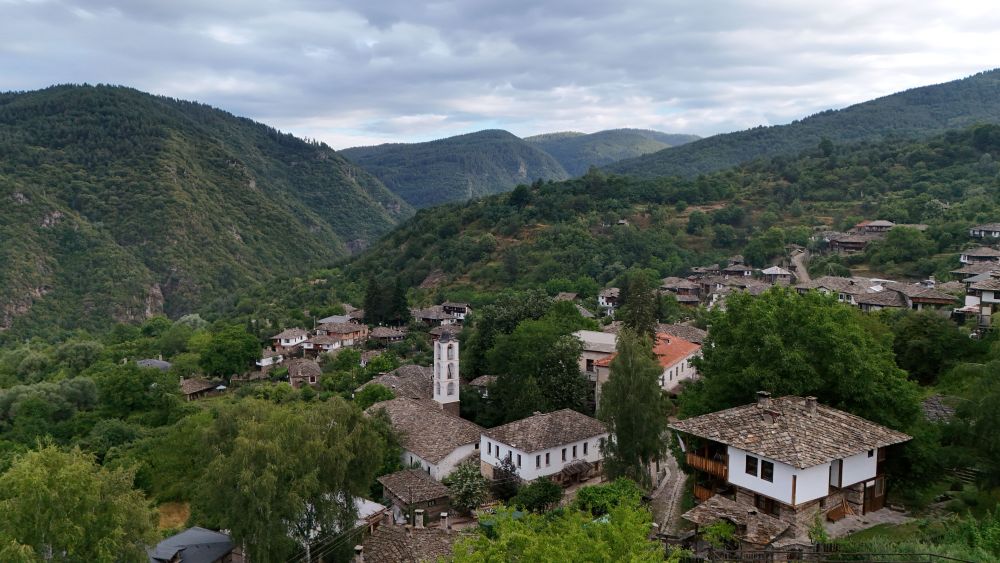 In the 1970s the screenwriter and playwright Georgi Danailov came here and Kovachevitsa became established as a very specific kind of “Bulgarian Hollywood”. Danailov’s writing about the village, encapsulated in The House at the End of the World (not translated into English), can be sampled in a booklet I found in my accommodation. What American academics might call the “bad binaries” in which the choice is between cities overhung with smoke, full of “neurotic” individuals, and a natural paradise, go too far, but he clearly loved this place.
In the 1970s the screenwriter and playwright Georgi Danailov came here and Kovachevitsa became established as a very specific kind of “Bulgarian Hollywood”. Danailov’s writing about the village, encapsulated in The House at the End of the World (not translated into English), can be sampled in a booklet I found in my accommodation. What American academics might call the “bad binaries” in which the choice is between cities overhung with smoke, full of “neurotic” individuals, and a natural paradise, go too far, but he clearly loved this place.
The chamber music festival arrived in Kovachevitsa (and in other places; the village is not its exclusive home but its nerve centre) in 2018 and this year was its seventh edition. Lora Tchekoratova, powerhouse pianist and vivacious, endlessly curious human, is the Chair of the Foundation, with husband, top violinist Georgy Valtchev, as Artistic Director; composer Dobinka Tabakova is on the honorary board, serves as honorary godmother and was the festival’s first composer in residence. Her Rhodopa for violin and piano launched the first festival. The title, Off the Beaten Path, was her idea. It follows on neatly from String Paths, the title of her first disc for ECM which made thousands of us fall in love with her music, and led to the incorporation of Bell Tower in the Clouds in one of the Europe Day Concert programmes I was glad to have a hand in at St John’s Smith Square. There's a link, too, to the related hint of another path, Stone Trail, the title of her stunning Piano Quintet which was the festival’s first commission in 2023.
A preliminary evening at the Dimiter Blagoev Community Centre in the town of Dobrinishte, overshadowed by the great Pirin mountain range, was my chance to hear it live, and the results were predictably powerful. Stone Trail was inspired by the mosaics in the Episcopal Basilica in Tabakova’s treasurehouse of a home town, Plovdiv, layered with pure geometry below and birds above.
The birdsong features, almost like angel messages, in the mystical, free-flowing second movement. My big question was how the exhilarating bell-like chords of the opening, “Carved in Time”, could possibly be matched by the finale, but they are, above all in the sheer exuberance of the coda which also (look and listen closer, which I still need to do) incorporates earlier themes and secret number-patterns inherent in the mosaic design. The proportions are perfect, the material superbly forged. 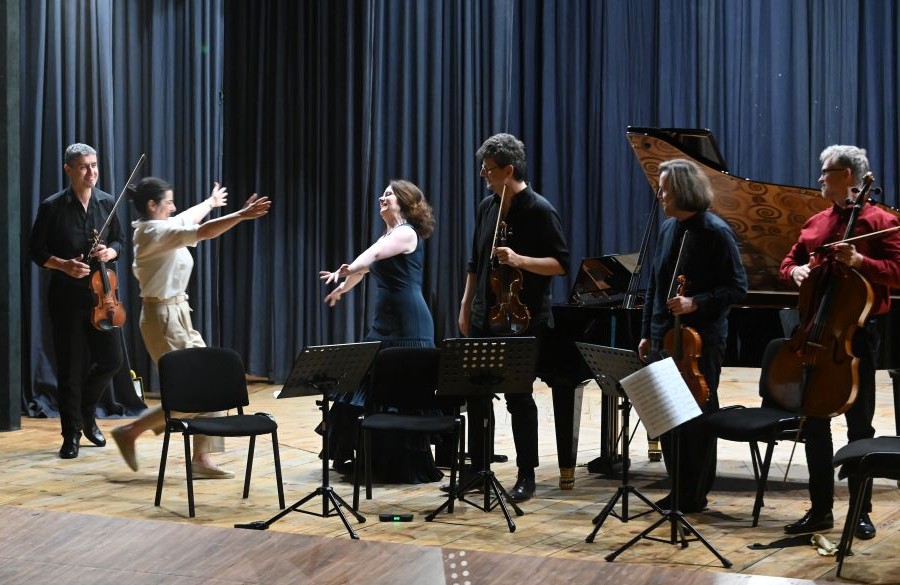
Karpatova (pictured below with Tchekoratova) provided the song component, a perfect communicator with a rock-solid technique and, despite her undeniable mezzo status, considerable soprano power at the top of the register who charmed in four languages, starting with Bulgarian song in Dobrinishte. The lovesick essence of “The Blue-Eyed” by Georgy Zlatev-Therkin was impossible to miss, even without a translation to hand. Later songs by Tosti and Carrie Jacobs-Bond may not have matched Ravel’s Greek folk homage (sung in French) for creativity, but the delivery was equally committed. 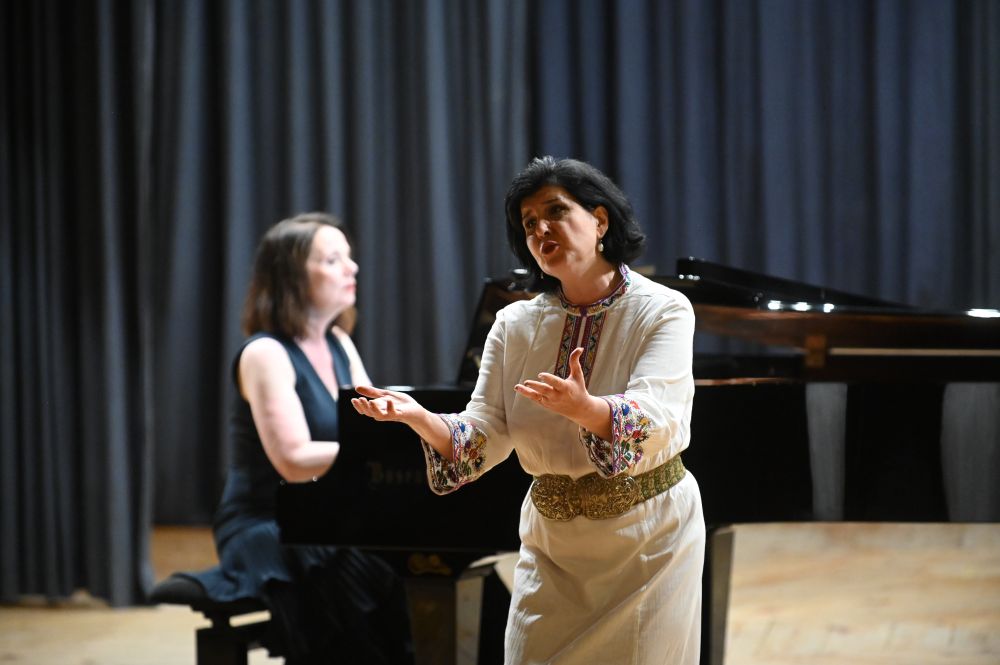
Starting with Mozart’s Eine kleine Nachtmusik for string quartet, led by a guest violinist and former leader of the Gewandhaus Orchestra Leipzig, Stefan Arzberger, was a happy inspiration (and I can’t remember when I last heard it in a concert). Arzberger, who met two of the musicians when leading the Sofia Opera Orchestra in its annual Wagner Ring, brought cultured turns of phrase throughout, especially in the ornamental links of the Romanza. 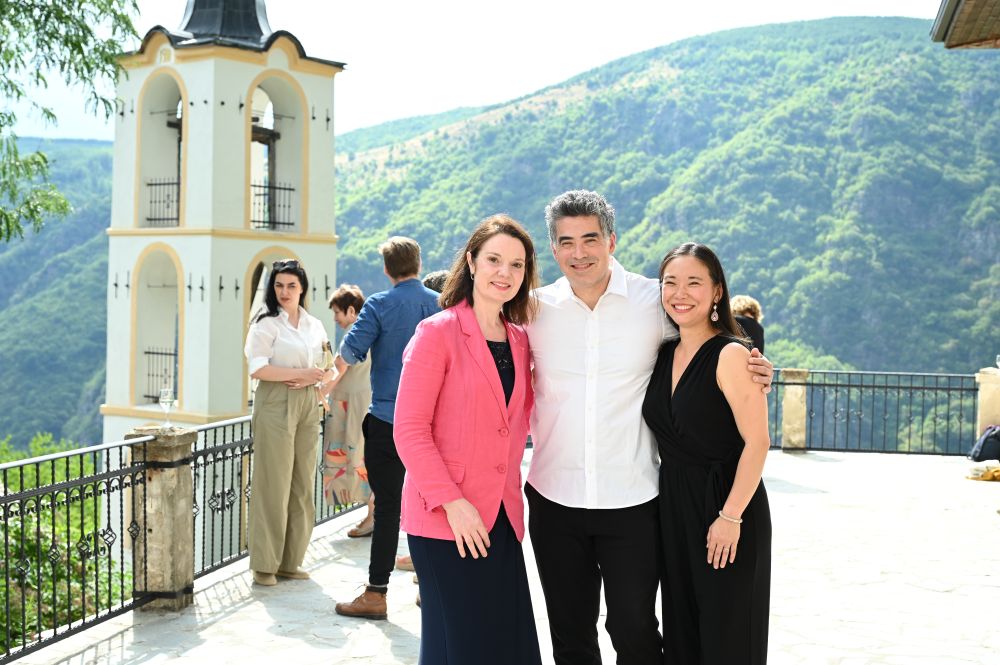
Bunch’s wife, Monica Ohuchi (pictured above on the concert-hall terrace with Tchekoratova and Bunch, Tabakova looking on) is a scintillating pianist, well up to any of the challenges he throws at her. Twice we heard her partner Tchekoratova in the four-hand version of Ravel’s La Valse. Far more than in any orchestral performance, you wonder how the instrumentalists will weather the evermore grinding gears in this dismemberment of the waltz; these two did it with a panache that was a joy to watch as well as hear, both on Dobrinishte’s Bösendorfer with a Klimt on the inside of the lid and, more easily, on Kovachevitsa’s state-of-the-art Yamaha (pictured below, Ohuchi raises arms to let Tchekoratova execute a glissando across the keyboard). 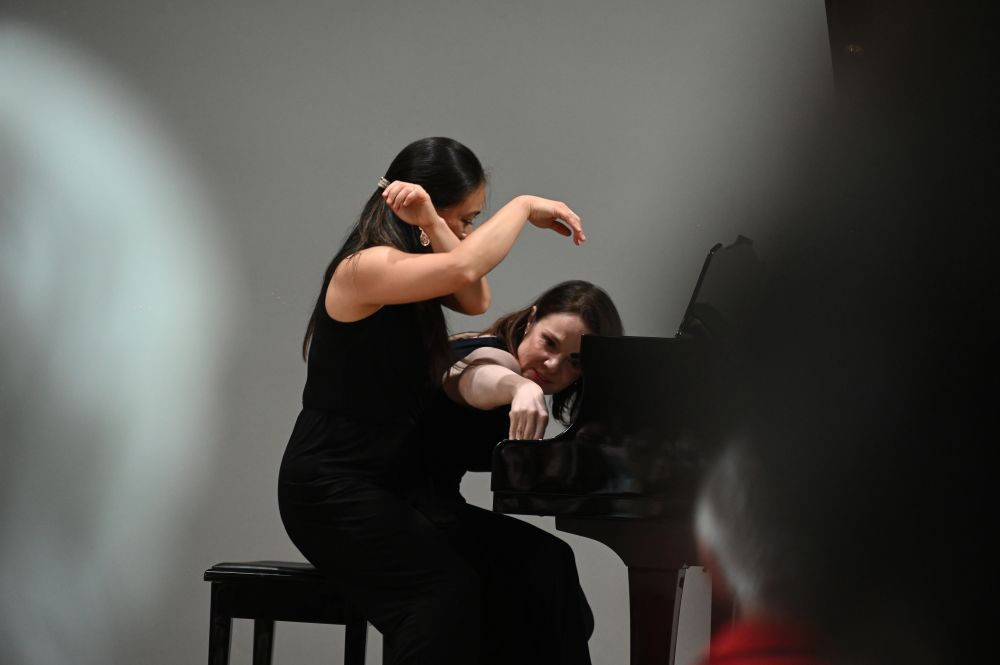
Tchekoratova took over the piano role the following evening for Frank Bridge’s Piano Quintet. She loves it dearly and hears in it English woodland magic, but I found more in there of French influence; the best theme of this relatively early work (1904 in its first version, though revised seven years later) is the finale’s second, which sounds like the best of Fauré. Kudos to the teams for revealing to us two late romantic giants I’ve not heard live in concert before. 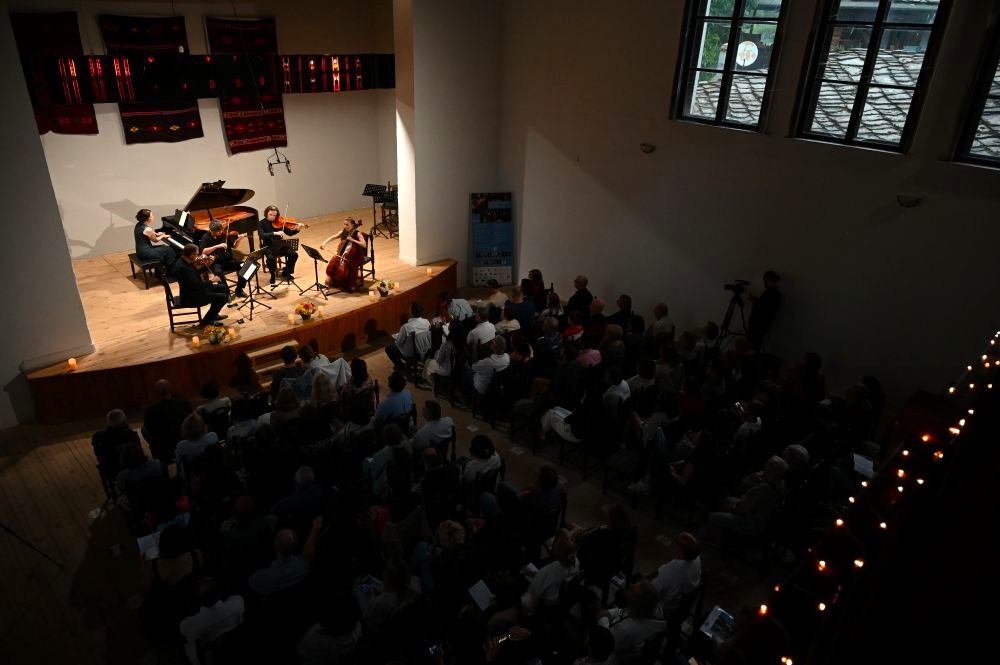
An unearthing of another trio, this time for strings (Takov, Cvetkov and Somov), by Henri Lazarov, a Bulgarian-born composer who’d settled in the USA, felt very much of its abrasive time (1970) and was lethally undermined in being preceded by the scrunching dissonances in Hindemith’s Germanically comic Overture to The Flying Dutchman as Sight-read by a Bad Spa Orchestra at 7 in the Morning by the Well as deliciously mis-played by Arzberger, Valtchev, Bunch and Atanasova. The fact that the band decides to sidle off into a Strauss waltz, which they play very well, provided another link, to the waltz song in Jacobs-Bond’s sentimental sequence and Ravel's Viennese nightmare. 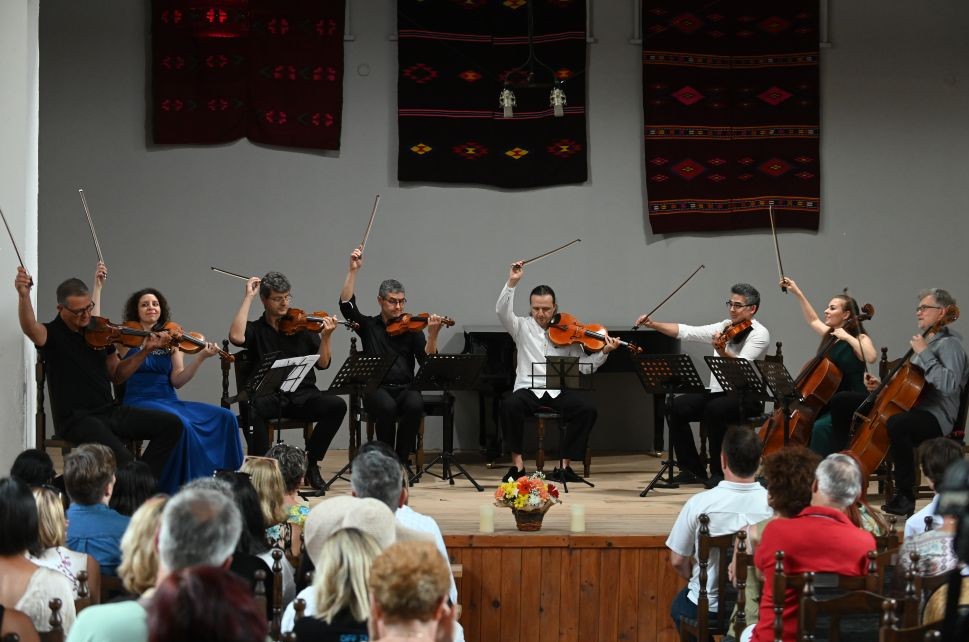
The players were delighted to have Arzberger, relatively fresh from his concertmaster post in Mendelssohn’s home town of Leipzig, to cap the radiance, but the real coup came from cellist Somov, kicking off the fugal finale with such hell-for-leather energy that every other player in the composer’s even distribution of voices simply had to follow suit: the end truly crowning the festival. 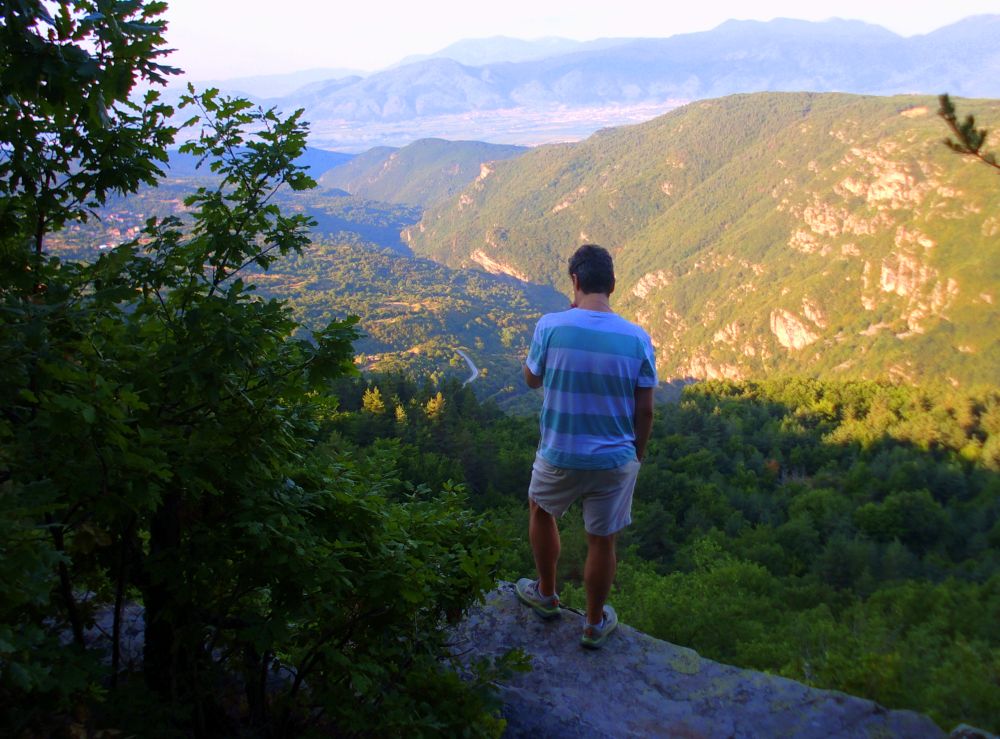
Explore topics
Share this article
The future of Arts Journalism
You can stop theartsdesk.com closing!
We urgently need financing to survive. Our fundraising drive has thus far raised £49,000 but we need to reach £100,000 or we will be forced to close. Please contribute here: https://gofund.me/c3f6033d
And if you can forward this information to anyone who might assist, we’d be grateful.

Subscribe to theartsdesk.com
Thank you for continuing to read our work on theartsdesk.com. For unlimited access to every article in its entirety, including our archive of more than 15,000 pieces, we're asking for £5 per month or £40 per year. We feel it's a very good deal, and hope you do too.
To take a subscription now simply click here.
And if you're looking for that extra gift for a friend or family member, why not treat them to a theartsdesk.com gift subscription?
more Classical music
 BBC Proms: Akhmetshina, LPO, Gardner review - liquid luxuries
First-class service on an ocean-going programme
BBC Proms: Akhmetshina, LPO, Gardner review - liquid luxuries
First-class service on an ocean-going programme
 Budapest Festival Orchestra, Iván Fischer, Edinburgh International Festival 2025 review - mania and menuets
The Hungarians bring dance music to Edinburgh, but Fischer’s pastiche falls flat
Budapest Festival Orchestra, Iván Fischer, Edinburgh International Festival 2025 review - mania and menuets
The Hungarians bring dance music to Edinburgh, but Fischer’s pastiche falls flat
 Classical CDs: Hamlet, harps and haiku
Epic romantic symphonies, unaccompanied choral music and a bold string quartet's response to rising sea levels
Classical CDs: Hamlet, harps and haiku
Epic romantic symphonies, unaccompanied choral music and a bold string quartet's response to rising sea levels
 Kolesnikov, Tsoy / Liu, NCPA Orchestra, Chung, Edinburgh International Festival 2025 review - transfigured playing and heavenly desire
Three star pianists work wonders, and an orchestra dazzles, at least on the surface
Kolesnikov, Tsoy / Liu, NCPA Orchestra, Chung, Edinburgh International Festival 2025 review - transfigured playing and heavenly desire
Three star pianists work wonders, and an orchestra dazzles, at least on the surface
 BBC Proms: Láng, Cser, Budapest Festival Orchestra, Iván Fischer review - idiomatic inflections
Bartók’s heart of darkness follows Beethoven’s dancing light
BBC Proms: Láng, Cser, Budapest Festival Orchestra, Iván Fischer review - idiomatic inflections
Bartók’s heart of darkness follows Beethoven’s dancing light
 Weilerstein, NYO2, Payare / Dueñas, Malofeev, Edinburgh International Festival 2025 review - youthful energy and emotional intensity
Big-boned Prokofiev and Shostakovich, cacophonous López, plus intense violin/piano duo
Weilerstein, NYO2, Payare / Dueñas, Malofeev, Edinburgh International Festival 2025 review - youthful energy and emotional intensity
Big-boned Prokofiev and Shostakovich, cacophonous López, plus intense violin/piano duo
 theartsdesk at the Three Choirs Festival - Passion in the Cathedral
Cantatas new and old, slate quarries to Calvary
theartsdesk at the Three Choirs Festival - Passion in the Cathedral
Cantatas new and old, slate quarries to Calvary
 BBC Proms: Estonian Philharmonic Chamber Choir, Kaljuste review - Arvo Pärt 90th birthday tribute
Stillness and contemplation characterise this well sung late-nighter
BBC Proms: Estonian Philharmonic Chamber Choir, Kaljuste review - Arvo Pärt 90th birthday tribute
Stillness and contemplation characterise this well sung late-nighter
 BBC Proms: Kholodenko, BBCNOW, Otaka review - exhilarating Lutosławski, underwhelming Rachmaninov
Polish composers to the fore in veteran conductor’s farewell
BBC Proms: Kholodenko, BBCNOW, Otaka review - exhilarating Lutosławski, underwhelming Rachmaninov
Polish composers to the fore in veteran conductor’s farewell
 theartsdesk at the Pärnu Music Festival 2025 - Arvo Pärt at 90 flanked by lightness and warmth
Paavo Järvi’s Estonian Festival Orchestra still casts its familiar spell
theartsdesk at the Pärnu Music Festival 2025 - Arvo Pärt at 90 flanked by lightness and warmth
Paavo Järvi’s Estonian Festival Orchestra still casts its familiar spell
 BBC Proms: Batsashvili, BBC Scottish Symphony Orchestra, Ryan Wigglesworth review - grief and glory
Subdued Mozart yields to blazing Bruckner
BBC Proms: Batsashvili, BBC Scottish Symphony Orchestra, Ryan Wigglesworth review - grief and glory
Subdued Mozart yields to blazing Bruckner

Add comment